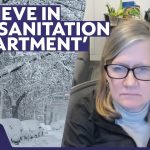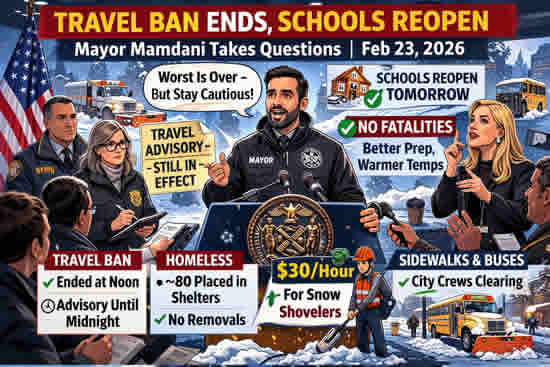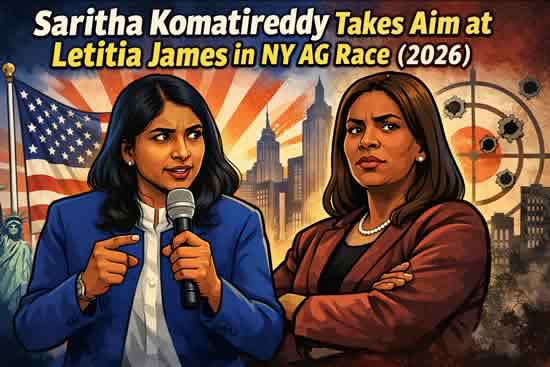
Mayor Eric Adams has announced the opening of 13 new clubhouses across New York City’s five boroughs to support people living with serious mental illness. These community-driven spaces, backed by a $30 million investment from city and state funds, offer a welcoming environment where members can build social connections, access health and legal services, and explore job and educational opportunities. For example, Elizabeth Leal, a member of Venture House, shared how these clubhouses helped her overcome personal challenges, secure a job, and pursue her dream of becoming an EMT. By 2027, these clubhouses aim to serve over 6,600 New Yorkers, providing a vital lifeline to reduce isolation and foster healing in local communities.
Transcript: Mayor Adams Announces Opening of 13 New Clubhouses to Support New Yorkers Living With Serious Mental Illness
Elizabeth Leal: My name is Elizabeth, and I’m a proud native of Washington Heights, New York. For the past 25 years, I’ve been actively involved with the clubhouse, and I’m confident to say I’ve been transforming my life in countless ways.
When I was in high school, I got into a serious altercation and was expelled from school. Due to the consequences of my actions, at 16 years old, I was homeschooled. My options were slim, but because no school wanted to accept me due to my history, nonetheless, I graduated high school with an advanced regents diploma.
Throughout my homeschool career, I was a straight-A student. It was there I met my teacher, who introduced me to Columbia University, where I studied computer science and finished with my certificate in computer programming.
Despite my academic success, trouble found me again. I ended up in jail, Rikers Island for approximately four months between 2011 and 2012. I first discovered the clubhouse model as a teenager during a crucial transition after aging out of St. Luke’s program in Harlem. At that time, my social worker moved into Venture House Queens, and I followed her lead.
Now I’ve been a member of Venture House Queens for four years, Venture House Bronx, which is closer to home. I love that I have the flexibility to be part of multiple Venture House communities and Venture House Bronx has quickly become one of my favorite places to visit.
Venture House has helped me rediscover my potential. I never thought I’d be able to work again, but with their support and transitional employment opportunities, I secured a position as a cook at UBS Arena one year ago.
Thanks to the connections and encouragement I’ve received through my peers, I also volunteer at Gotham EMS and Bedford-Stuyvesant EMS as I pursue my dream to become an EMT. Perhaps most importantly, the social skills and confidence I’ve gained through Venture House helped me grow closer to my family and build stronger relationships at home.
I want to be a role model, especially for my 15-year-old son. The impact of these communities have deeply, personally, and extremely life-changing, and I’m grateful every day to be a part of them. I thank the Adams administration for their support of the clubhouse and the opportunities these spaces give our community. And now I’d like to turn it over to Mayor Adams.
Mayor Eric Adams: You know, that was a powerful story, and I am sure that if we were to speak with each one of your colleagues here, their stories would be similar, and, you know, it takes a lot to go into your own story and expose yourself to criticisms and critiques and people judging you, and when you come and you share part of yourself, you just really want people to know that they’re not alone.
We all move around like we are perfect, but, in fact, we’re not. All of us are going through something. All of us are having those moments, and, you know, when you come and just give us your story, it compels all of us to feel a level of comfort that I can be who I am. You may not have heard it, but I’m perfectly imperfect. Perfectly imperfect. You know, but I’m dedicated. That’s more important.
And I am at home here. You know, I am at home here, and when I walk into places and spaces like this of perfectly imperfect people, you can feel at ease, because all those perfect folks, I don’t want to hang out with them. I don’t want to hang out with them.
So I really thank you, Liz. I value you, and I’m going to, from time to time, when I’m up in the BX, I’m going to come into this clubhouse and just sit around and hang out with you guys and ladies and cook a meal. Who cooks the best meal here? You know? We’re going to cook a meal. I’m going to give you one of my plant-based meals, you know, and just enjoy some food.
You know, the clubhouses are important. It was first introduced to me by former Commissioner Dr. Vasan, who was a part of a clubhouse. And I was just really blown away when I was running for office. And when he shared with me the concept, I asked him to join the team, and we immediately looked into what we can do around clubhouses, because loneliness is a major social determinant to health.
Not feeling like you’re part of a community, not feeling that you’re part of a group, it actually has an impact on your physical health. And that is why it is so important to have places like the clubhouse, these clubhouses.
And from day one, that’s what we said we were going to do. We were going to tackle severe mental health illness or just mental health illness. We were not going to ignore it. It was a Herculean task to build that trust and allow people to know that the city is here for them. And I wanted to be, you know, clear on that.
I always talk about when I finish my law enforcement career and, you know, even when I think about it, sometimes I get choked up. I was having a meal with my son, Jordan, and I just finished the career, and Jordan looked at me one day, we were eating, and he said, “Dad, are you all right?” And I said, yeah, I was joking it off, because as police officers, you joke off, you laugh at everything.
And he grabbed my hand and didn’t let me pick up the next bite. And he looked at me and he said, “Dad, are you all right?” And I had to think about it, that I wasn’t. And we’re not all right. That’s why we’re here today. We’re here today to announce 13 newly contracted clubhouses across the five boroughs, because people are not all right. That’s why we’re doing it. Because they’re not all right.
Moms, dads, children, aunts, uncles, we’re all feeling the weight of life on our shoulders. And these clubhouses are free, member-led spaces where people can develop social connections and access health and legal services, as well as employment and educational opportunities. And each clubhouse has its own vibe and personality and response to the needs of local community and clubhouse members.
We were in Brooklyn. The Brooklyn Clubhouse is different from this clubhouse. All of them have their own ways of communicating, so members can take cooking classes or language lessons or engage in other activities. Most importantly, the clubhouses decrease social isolation, which adds to stress and makes it even more difficult to function.
Seven of the clubhouses will be new, while six have been granted contracts to continue operations. And by 2027, these 13 sites will serve over 6,600 members. And we’re really proud of this. We’re really, really proud of this. This is one of our most significant achievements. The clubhouses continue our End Culture of Anything Goes campaign, which highlights our work to change the laws and culture around handling untreated serious mental illness.
We were just walking past people. We were watching people in pain, you know, that old soulful ballad, if you take a close look at my face, my smile is out of place and you’ll see the tracks of my tears. People were hurting in front of us and we just were just saying, good morning, how are you? They were saying, we’re hurting. We were saying, have a nice day. Instead of stopping and saying, I want to help you through the day. And that’s what this is about.
We do not believe it is humane or neighborly to allow our fellow New Yorkers to suffer when they need help. It’s just wrong. It’s just wrong. The clubhouses are the results of a $30 million investment of city and state funds, which led the Department of Health to release an RFP to expand the clubhouse model.
This is the first expansion in over 30 years, over 30 years. As we saw the need go up, we did nothing to keep up with the need. The clubhouse model complements our SCOUT and PATH programs, what we’re doing in our subway system, where people are living in our subway system with the need of care. And we’re in the system talking one-on-one with people, building their trust.
It also expands on our 1,400 new safe haven and stabilization beds for New Yorkers in need. Additionally, this year, the state passed a law that removes barriers to psychiatric care for those unable to recognize their own need for it. And we have been a long advocate of it, and we’re thankful that they passed the law. We think there’s more to be done, and we’re going to continue to advocate for it.
We’re also making sure that new data in involuntary hospital transport will be publicly available as we make the process as transparent as possible. Our goal is to show how important this step is for our city. Because justice and compassion, they must go together. Not that they can go together, they must go together.
And serious mental illness is a serious problem for those suffering from it, and it impacts the family. One who’s experiencing serious mental illness is not alone, the family’s also impacted. I hear the stories all the time, when I’m on the streets, family members are just asking how can they help. No one wants to see a family member go through a severe mental health issue. They want to be there for them, and we have to be there for their families.
Compassionate responses like clubhouses are crucial to solving the problem, and we are proud of what we’re doing in this space, and we’re going to continue to help our brothers and sisters who are in care, particularly those who come from a faith. I say it over and over again, if Matthew, Mark, Luke, and John were here right now, they’d be in this clubhouse helping our brothers and sisters. I’m going to turn it over to Dr. Morse.
Acting Commissioner Dr. Michelle Morse, Department of Health and Mental Hygiene: Thank you, Mayor Adams, thank you Liz. Thanks to all of you for having us today. It is really an honor to get to celebrate this huge milestone with you.
I know you all feel it, but as soon as you step into this space, you feel the support, you feel the healing. This is a model that’s about healing, and as the city’s doctor, that is one of my top priorities. How do we— thank you, yes.
Thank you for showing us the way in the model that you have built here at Venture House, and we’re very, very excited about your new space around the corner. I also want to acknowledge Venture House CEO, Juliet Douglas, for hosting us, and again, just really thankful that we get to celebrate this incredible milestone together today.
Because of the Adams administration, after entering new contracts to increase clubhouse access and improve services for the first time in nearly 30 years, as the mayor said, all 13 clubhouses across five boroughs are now open and operating. And again, that includes where we are standing and sitting right now, and this is a milestone that’s possible because of the city and state’s expanded commitment of $30 million to clubhouses.
The social support and community and healing that is possible here in Venture House Bronx is priceless for adults living with serious mental illness. Here I know that part of what you do is helping members to find employment and educational opportunities, connections to housing and healthcare, and consistent social connection, which can completely change the trajectory of someone’s life.
At the Health Department, we believe wholeheartedly in the value of this work, and we want to ensure as many people as possible who want to become members have access to a clubhouse in the community where they live. As Liz mentioned, she spent years coming and commuting to the Venture House location in Jamaica, Queens, and we’re so grateful for her voice today and her ability to share with us the path forward providing and sustaining this newly contracted clubhouse.
Clubhouses work precisely because every member has a stake in shaping the community that they’re a part of. And the clubhouse space we’re in today is a blueprint for what’s to come. Its members, some of you here today, are quite literally building it from the ground up, and we know that creating and participating in clubhouses can be a lifeline. A sense of community informs every aspect of health.
I, myself, am an internal medicine doctor, and the majority of my patients who get hospitalized often have a form of chronic disease, and serious mental illness is the most common condition I see amongst my patients. I know how quickly social isolation can erode both mental health and physical health. And regardless of any diagnosis, we all need to feel connected.
As humans, we need to feel like we fit somewhere, and clubhouses offer a sense of belonging to their members, and doing so proves just how important community care is for every aspect of health. And at the Health Department, it’s again our responsibility to invest in that.
We thank Mayor Adams for his leadership on this issue. And again, I could not be more proud to see the investments that we’ve made coming to fruition today, and so many days ahead of us. Thank you again.
Question: So, two questions. About the smaller clubhouses who weren’t eligible for government funding [inaudible], are those being phased out or is there [inaudible]? And then the second question is just about the timing of this. Why celebrate now?
Mayor Adams: Excuse me. You said, why now?
Question: Yeah, exactly. Why are we celebrating this now?
Mayor Adams: Yeah, we and Dr. Morse can talk about the first part, but we had an announcement in Brooklyn where we did some things around clubhouses in Brooklyn. This is a continuous expanding evolution, and we expanded. This is the first time we did this expansion in over 30 years. And so there’s never the wrong time to do an expansion, it’s always the right time. We put out an RFP. The winners of that RFP, we’re now going to make sure these sites are open.
Can we talk about the ones, the other ones?
Acting Commissioner Morse: Thank you for the question. Thank you, mayor. I’ll just add that in terms of other clubhouses, we’re very thankful, of course, that there are lots of clubhouses across the city. We’ve been working with the City Council, who’s been supporting some of the additional clubhouses.
Part of our goal with this RFP was really to both improve access by having more spaces, including the new space around the corner, so that more members can join clubhouses that are interested. Our goal is to get up to about 6,600 members over the next year or two. And in addition to that, part of our goal is actually to really improve the data and demonstrate the outcomes. And so that’s all part of the process that we’ve led through this new RFP.
Mayor Adams: Okay, folks, I’m going to do a few off topics. You can be excused from this.
[Crosstalk.]
Mayor Adams: I’m going to do a few off topics.
Question: So President Trump yesterday, you know, said he’s going to have federal takeover of D.C. and said he was going to look at New York City. What does that mean to you? Did you have any conversation with the Trump administration about this?
Mayor Adams: The NYPD, particularly the Deputy Mayor of Public Safety Kaz Daughtry, is in, thanks a lot to you, is in continuous communications around public safety, particularly around coordination with our federal partners. And I mean, the numbers speak for themselves, you know.
A record number of decrease in homicides in the shootings in the first six months, in the seventh month, lowest number of shootings victims and shootings in the city. All the major crime categories are decreasing in the subway system. We are realizing crime is at the lowest this year. I’m outside of two years of the pandemic.
And so, what happens is that sometimes when you come off a shooting that happened at 345 Park Avenue where we lost Officer Islam and three other New Yorkers, when you have those high profile shootings, it sends a signal sometimes across the country that we’re dealing with a crime issue in New York. And we’re not. You know, those headlines give the wrong impression.
New York is moving in the right direction in public safety. And if the federal government wants to assist us in really navigating some of the laws around easy accessibility to automatic weapons. I mean, you know, this person who shot up 345 Park Avenue, he drove across the country with an automatic weapon. And he had a history of dealing with, you know, mental health issues. So there is some assistance we can get from the federal government.
We should deal with stopping the access of these guns. There are more grants that I think our federal partners can get. And so I’m not part of the group that says we don’t want to work in coordination with the federal government, but we don’t need anyone to come in and take over our law enforcement apparatus. We have the finest police department on the globe. People come here to be trained and people speak with us to get assistance.
And so, if the White House wants to help us in what we’re doing to continue our success, and if we can help other cities, municipalities, they may want to ask us to come in and help other cities. We’re willing to go into other cities and help them as well. But we don’t need anyone to come in and take over. We got this under control.
Question: So, I just wanted to get your take. There’s a new Siena College poll out that has you behind Andrew Cuomo and even Curtis Sliwa. I know polls are polls, but I wanted to get your take on the poll. It even has your unfavorability lower than Cuomo’s, or favorability lower than Cuomo’s. So I just wanted to get your take on the poll. Is there anything that you’re going to be doing in terms of your strategy, how you’re going to be messaging to people?
Mayor Adams: Well first, if I don’t recall, that’s a statewide poll, statewide. I’m not running for governor, I’m running for mayor, and I don’t quite understand what’s the purpose of doing a statewide poll on the mayor’s race.
I’ve said this over and over again, you look at the candidates that are running, they have spent millions of dollars telling their story, millions. I think Andrew spent about 30-something million. Same with Zohran, he has spent a substantial amount of money as well. When you have millions of dollars spent to tell your story, that’s what you’re going to get.
Now is our opportunity. I can tell my story now. The money that I raised, I can use to tell my story. You do your TV ads, you do your flyering, you put your information out. So now it’s campaign season. And so a poll that judges the state, even if they indicated that my unfavorabilities has gone down, people are starting more and more to see what we are doing. And so you just got to stay focused in these races. If not, you’ll be distracted by polls and comments and all of that.
Remember, at this time, during the primary, at this time, Zohran was at 1 percent. At this time. He was at 1 percent from the time that it was out from the election. And from 1 percent, he won the primary, because he was able to get his message out. And Andrew had a poll that showed him the day before the election, he was up 10 percent, 10 percentage points. He lost by 13 or 14.
So, if there is no better case to talk about how these things shift and change, I think that’s a perfect example. You have a person who’s at 1 percent won the primary, a person who was at 36 percent lost by 13 points. I mean, is there any better example of why you just have to stay focused? What he did, he, being the primary winner, he stayed focused. He heard me say stay focused, no distractions and grind. And I guess he did it also. You got to stay focused in this stuff.
Question: You haven’t really ramped up your campaigning yet or your message. Do you feel like you’re just getting started or like you’re still in kind of messaging mode or what do you feel like is kind of next for you? Do you feel like this is just the beginning in the next month or so we’re going to see a lot more from you, a lot more campaigning? What do you think?
Mayor Adams: Well, I think you see a lot from me now, I’m in the streets, I’m speaking with people and I enjoy doing this. To me, this is not campaigning. This is not campaigning. Probably to a lot of people, it’s work and it’s campaigning. It is not. I love being around people. And I’m going to love being around people, ordinary, everyday, working class people. I get energy from everyday people. And so to others, it’s like, “Oh, I got to get up and I got to go talk to these people.” No, I’m like waking up and say, man, I’m getting ready to go hang out in the Bronx at a clubhouse. I’m excited about this.
So, this is not work for me. Someone once said, when you’re doing what you love, you’re never having a job. What I’m doing right now, no matter what I do, I’m going to do it. I’ve been doing this for 40 years. So I just enjoy doing this and I’m going to continue to do it no matter what capacity I’m in in the city.
Question: Two topics, if you don’t mind.. One is a real success story here in the city, and that is the increase in English and math test scores in public schools. What do you attribute that to? What is working?
Mayor Adams: Well, it’s a combination. I have talked to the chancellor. I spoke with her, must have been about six months ago. And I told her that we need to identify children who are struggling and I need her to come up with a plan on that. And she did.
We would check in periodically, every few weeks she would give me an overview. And what they did, they went after those struggling students. When they zeroed in on them, they had plans on giving them the support that they needed. And it’s a real positive story on her part, how as a former teacher and principal, she understood how to turn around a school.
If you know how to turn around a school, then you can turn around a school system. And I was impressed each, probably every two weeks she would come back and say, here’s what we’re doing. Here’s how we’re identifying those children who are struggling. They were doing quizzes and tests during the time. Remember we changed the reading curriculum to a phonic-based reading system. And it made a huge input.
And now we’re not what we want to be. You know, I want to be clear on that. When you look across the country, it is embarrassing when you see what children, what grade levels they’re reading at, particularly Black and brown children, across the country. This is a real call for action for our country. But we are moving in the right direction. And hats off to her, a Bronx girl that understands how to take care of our children in the city.
Question: And second topic, just to elaborate on your answer a moment ago, you know, the poll shows you in fourth place behind Curtis Sliwa. I’m wondering, you know, what do you need to do to win? And what are you going to do next month? And what are you going to do next month if Andrew Cuomo asks you to drop down?
Mayor Adams: Okay, first of all, I already won. I’m a mayor that grew up, you know, I don’t think people really understand, I think, you know, that’s one of the challenges that people have in life. They judge themselves by what people think of them. I already won. I’m the mayor of the most important city on the globe. Growing up in South Jamaica, Queens, you know.
And I say it over and over again and one day people are going to hear it, you know, growing up in South Jamaica, Queens, dyslexic, arrested, rejected. Now I’m elected to be the mayor. So, I mean, God is good. And so if I wake up every day and say, oh my God, I’m a failure because somebody thinks of me this way. Someone gave me the fingers, someone yelled at me, someone, I mean, no, I have already won.
They are trying to get what I have. Let’s understand that. Let’s understand it. There were 13 people running to be mayor, 13 people wanting to have what I have right now. 13 people. Either I’m going to get it or someone else, but those other 12 will never get what I am. You know, I’m the mayor right now.
And so, and so I’m going to do what I have to do to be reelected because of what we have done while we’re in office. All these broken promises, you know, we got, we have what, five people that are still in the race? Three of them don’t have any record at all, no record. One of them, he’s running from his record. I’m the only one that has a record. I’m the only person in the race. And that’s why you can critique me.
That’s why you, all of you could ask me questions because I have a record. My expansion of clubhouses, what I did with SCOUT, more jobs in the city history, drop unemployment, brought down crime, removed thousands of guns off our streets. No more taxes for low-income New Yorkers. No more taxes for low-income New Yorkers.
Dropped the cost of childcare from $220 a month to less than $20 a month. Earned income tax credit increase, paying off college tuition for foster care children, high-speed broadband for NYCHA residents for free, so they could have access to it. I mean, so I— let me finish my flow, let me finish my flow, because you know I’m flowing right now. I want to give flow.
So no matter what happens, I improve the lives of working-class people. That’s what I said I was going to do when I was running. I said I was going to improve the lives of working-class people. I did that. Now I want to complete doing that. And so if the people of the city say that, you know what, we want someone else to do it, I mean, that’s life. I can’t sit back and complain.
I ran, I sold my vision to the city. They said this is what we want, and I have to get out there and sell, this is what I’m going to do for you in the next four years. But the people of the city are going to make that determination. They’re going to hear me, and they’re going to say, do we want to continue after we heard you, Eric? And then I make a decision. And it’s all cool.
Question: But given the variety of the polls and where you are in the polls, given the variety and the consistency of the polls, what is going to be your breakthrough moment or announcement to jump up in the polls or get beyond?
Mayor Adams: Yeah, okay. Could we, will we agree on this? I want us to agree on this. When Mamdani was 1 percent in the polls, many of you would have told him, “You’re at one percent. Get out.” Should he have listened to you? If he would have listened to you he would not have won the primary. He was one percent, one percent, and many people said, “You’re one percent, get out of the race.”
So, that’s what I want to say to the people here at the clubhouse. Don’t listen to the haters, let them be your waiters, you know what I’m saying? So, think about it. I don’t see how you’re not even factoring this in. If he would’ve listened to everyone who told him, “Hey, you’re one percent. You don’t stand a chance. You’re one percent.”
If I would’ve listened to people who said, “Listen, you’re dyslexic, you don’t stand a chance.” You gotta stop listening to people because, those people who are telling you to drop out, they dropped out. They gave up, they surrendered. And they’re looking at you upset. “Darn it, you didn’t surrender when Covid was here? You didn’t surrender when migrants and asylum seekers were here? You didn’t surrender when they indicated you? You didn’t surrender when they called you names?”
So they’re looking at me and they’re seeing what I am and they’re upset because they’re saying, “If I was you, I would have given up.” I don’t give up, I step up. That’s why.
August 12, 2025
Sources: NYC.gov , BigNY.com Mew York News













